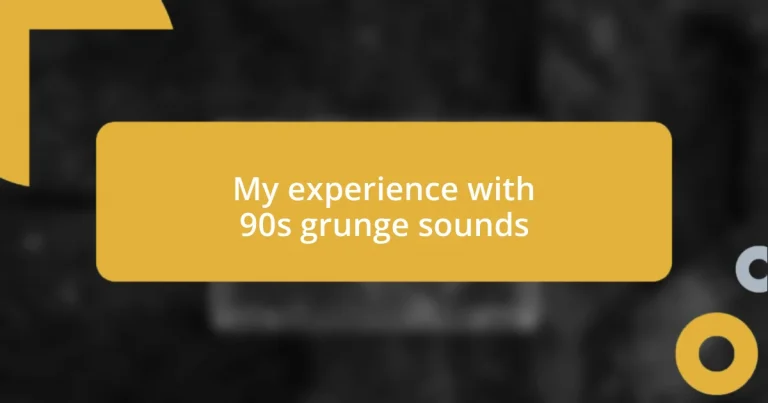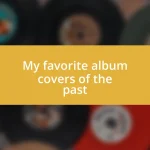Key takeaways:
- Grunge music, emerging from Seattle in the late 80s, resonated deeply with themes of disillusionment and vulnerability, providing a therapeutic outlet during the often turbulent teenage years.
- Key bands like Nirvana, Pearl Jam, and Soundgarden played pivotal roles in defining the genre, creating music that connected listeners through shared struggles and authentic expression.
- Embracing grunge culture involves finding personal style, engaging with live music, and processing emotions through the genre’s raw and honest themes.
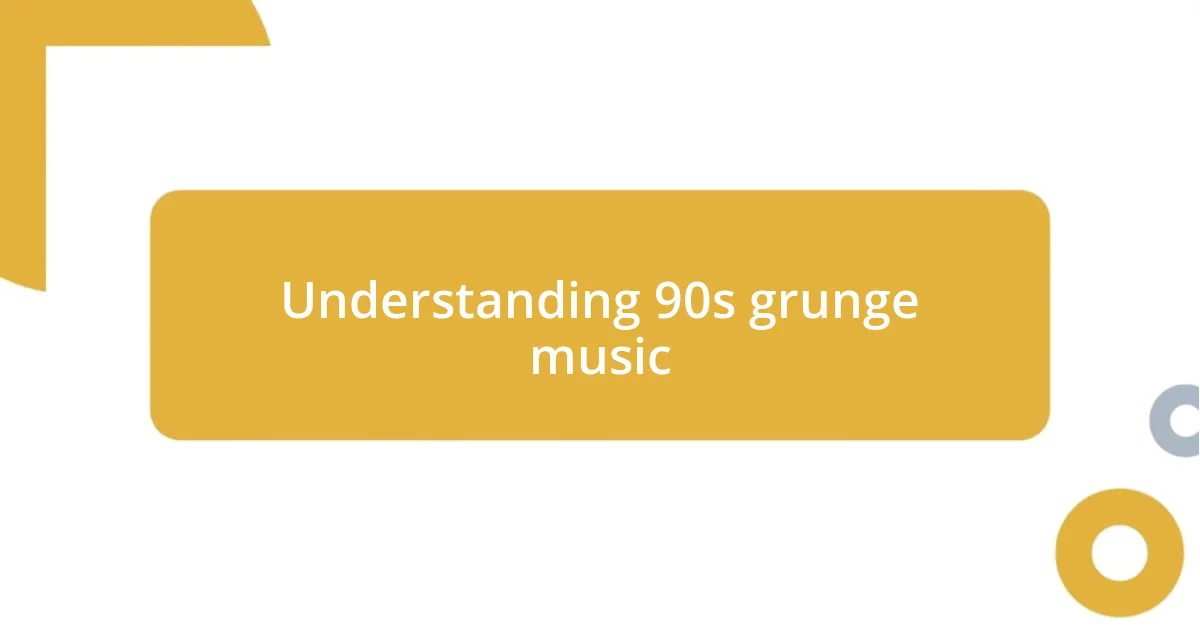
Understanding 90s grunge music
Grunge, originating from Seattle in the late 80s, exploded into the mainstream in the early 90s, bringing with it a raw, unapologetic sound that challenged the polished aesthetics of previous rock genres. I still remember the first time I heard Nirvana’s “Smells Like Teen Spirit”—the way Kurt Cobain’s raspy voice mixed with that heavy, distorted guitar struck a chord deep within me. It felt like a release, an anthem for anyone who felt a little lost, which was so relatable during those awkward teenage years.
What I always found fascinating about grunge was its connection to the realities of life; it captured the feelings of disillusionment and existential angst that many of us grappled with. For instance, listening to Pearl Jam’s “Black” made me reflect on heartache and loss in ways that felt honest and real. Could any other genre evoke such emotional depth while sounding like it was daring you to embrace your flaws?
The distinct blend of punk, metal, and alternative rock in grunge music created something refreshingly different. It wasn’t just about the art; it was a movement, an expression of a generation’s angst and frustration. I often ask myself, did the music create the mood, or did the mood shape the music? Regardless, each riff and lyric felt therapeutic, providing an outlet for emotions we often struggled to articulate.
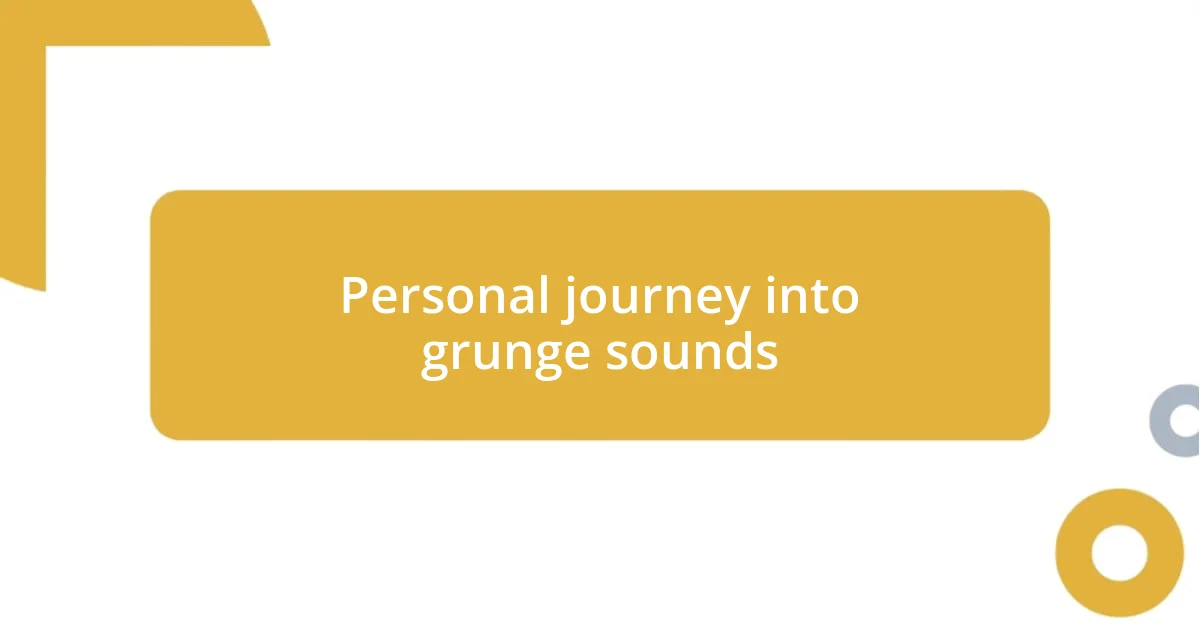
Personal journey into grunge sounds
As I delved deeper into grunge, I discovered the eclectic mix of sounds that defined the genre. Each band brought its unique flair, yet they all echoed the raw honesty I craved. I recall sitting in my bedroom, vinyl spinning as Soundgarden’s “Black Hole Sun” enveloped me. The haunting melody had a way of lingering in my thoughts, almost like a reminder that it was okay to feel a bit out of place.
Venturing into Seattle’s grunge scene, I was captivated by the sense of community surrounding it. It wasn’t merely the music; it was the feeling of being part of something larger. I remember attending a local show where a lesser-known band performed. They poured their heart into every chord, and I felt a sense of connection I hadn’t experienced before. Witnessing their passion and vulnerability inspired me to embrace my own authenticity.
Reflecting on that time, I realize how profoundly grunge shaped my perspective on music and life. It taught me that it’s okay to be imperfect and that vulnerability can be a strength. I often think back to the lyrics of Stone Temple Pilots’ “Plush” and how they resonated with my struggles; it was empowering to see my emotions reflected in art. This genuine connection continues to remind me that music is not just sound—it’s a shared experience that binds us together.
| Aspect | Grunge Experience |
|---|---|
| Emotional Resonance | Music as therapy for my teenage angst |
| Community Feeling | Connection with others who shared my struggles |
| Impact on Identity | Embracing my imperfections and vulnerability |
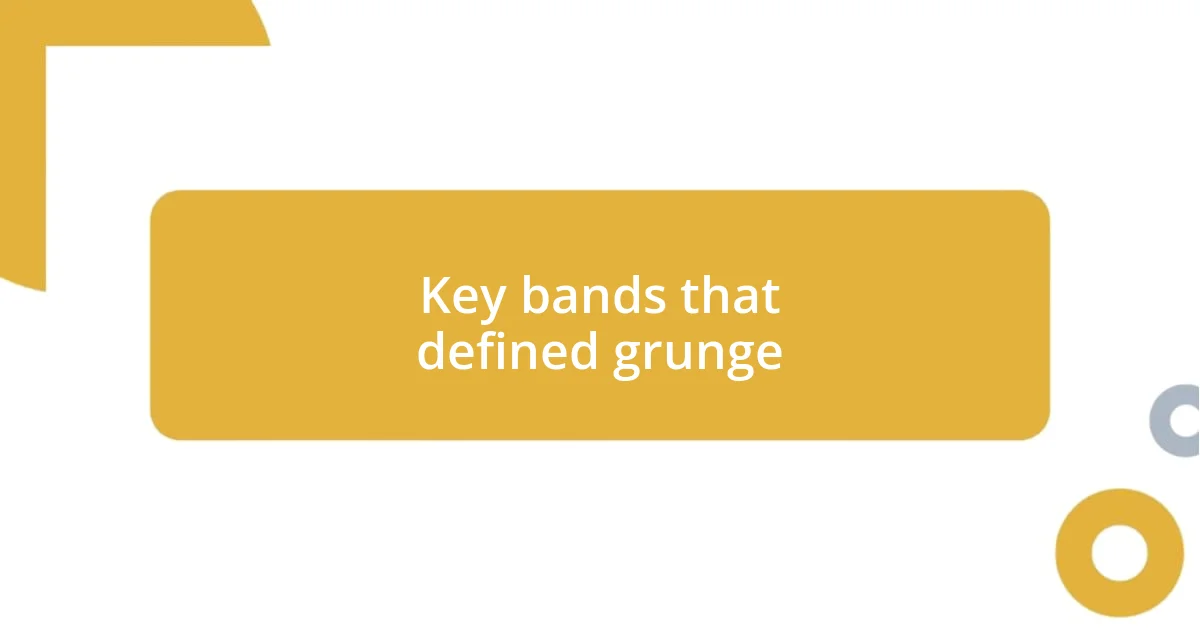
Key bands that defined grunge
When I think about the bands that really defined grunge, a few names instantly come to mind. Nirvana absolutely was at the forefront, not just because of their music but due to the cultural moment they created. I can still feel the rush when I listened to “Come as You Are” for the first time—there was something about that song that seemed to welcome me just as I was, imperfections and all. Pearl Jam followed closely behind, contributing anthems that defined a generation, like “Alive,” which still sends chills down my spine. Their powerful lyrics often felt like a direct conversation with my teenage self, full of questions that needed answers.
Key bands that shaped grunge:
– Nirvana: Their raw sound and emotional depth paved the way for the genre.
– Pearl Jam: Known for their profound lyrics and explosive live performances.
– Soundgarden: Their heavy riffs and haunting melodies created a unique sonic landscape.
– Alice in Chains: Blending metal with grunge, they captured darker themes with emotional intensity.
– Stone Temple Pilots: Their melodic hooks and diverse sound showcased grunge’s versatility.
Each of these bands brought a distinct flavor to the movement while also echoing the struggles and stories of so many. I remember a time when I listened to Alice in Chains’ “Nutshell” and related to its stark honesty; it was as if Layne Staley was pulling the curtain back on my own fears and insecurities. Those moments of connection are what made the grunge scene feel like a safe haven for all of us searching for our place in the world.
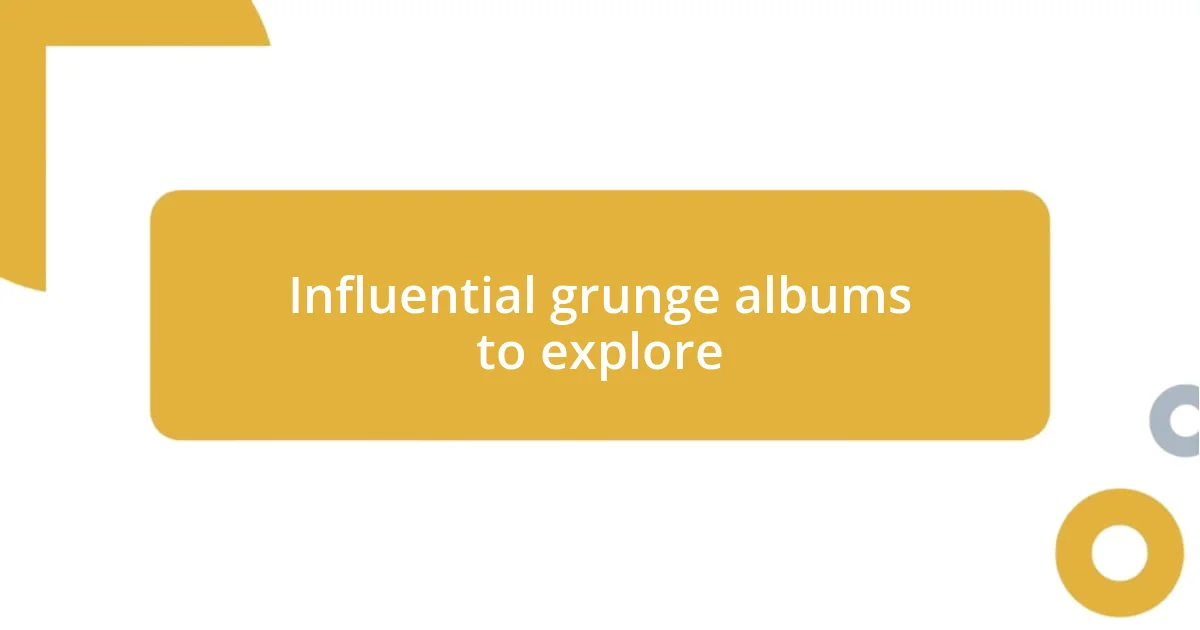
Influential grunge albums to explore
Exploring influential grunge albums is like diving into a deep, resonant ocean of sound that changed music forever. One standout for me is Nirvana’s Nevermind, which felt revolutionary when I first heard it. The raw energy of “Smells Like Teen Spirit” encapsulated a rebellious spirit that resonated with my teenage angst—didn’t we all just want to scream out our frustrations? That album taught me that vulnerability could be powerful, and it was a pivotal moment in my understanding of self-expression.
Another album that left a mark on me was Soundgarden’s Superunknown. The first time I listened to “Spoonman,” I was captivated by the dynamic combination of heavy riffs and intricate melodies. It left me pondering how music could encapsulate such a wide array of emotions. I can still picture myself, headphones on, getting lost in the complexities of Chris Cornell’s voice, feeling like I was discovering a hidden treasure, something that spoke directly to my soul.
Then there’s Ten by Pearl Jam, which I often returned to for its emotional depth. I vividly recall contemplating future uncertainties while “Black” played softly in the background, its somber yet hopeful melody weaving into my thoughts. The lyrics resonated so deeply with my experiences of love and loss, making it seem as if Eddie Vedder was giving a voice to my own unspoken feelings. Each of these albums brought a new layer to my understanding of not just music, but art as a reflection of life’s complexities. Have you ever had a moment where a song felt like it was narrating your own story? For me, that connection is what makes exploring these influential grunge albums so meaningful.
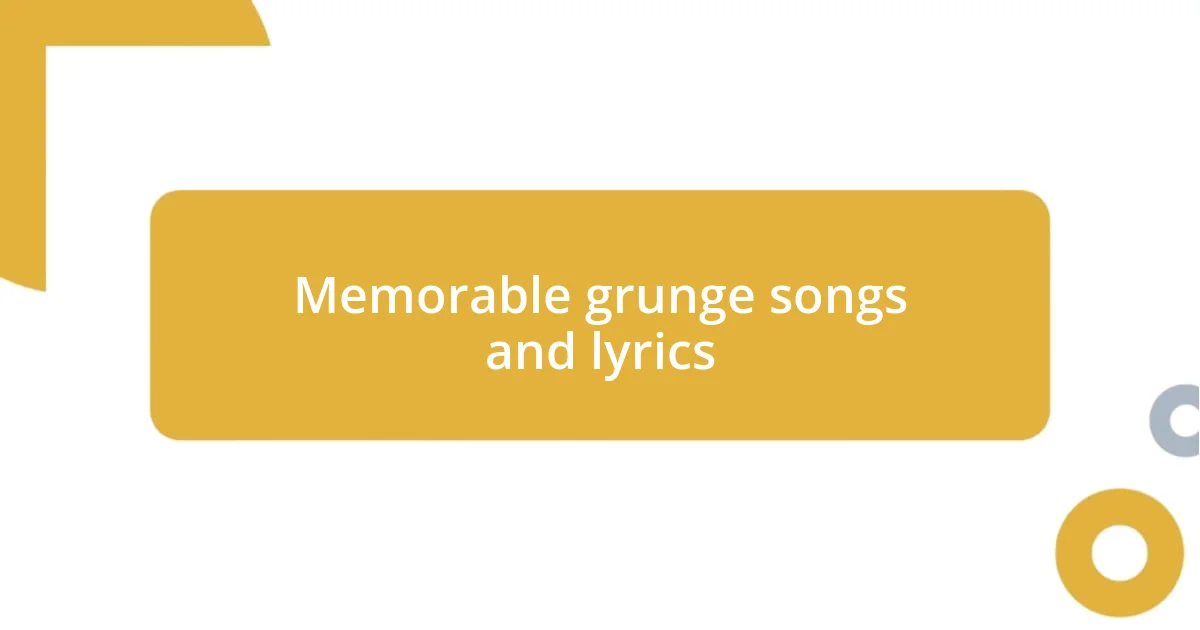
Memorable grunge songs and lyrics
One unforgettable song that lingers in my mind is “Fell on Black Days” by Soundgarden. The moment I first heard Chris Cornell’s haunting vocals, I was drawn into a whirlwind of raw emotion. The lyrics seemed to articulate a deep-seated sense of existential dread that I often grappled with—how often do we feel like we’re grappling with the weight of the world? It felt both like a reflection of my struggles and a comforting reminder that I wasn’t alone in facing life’s darker moments.
Then there’s “Plush” by Stone Temple Pilots, a track that I still crave to hear on road trips. The blend of Scott Weiland’s ethereal voice and the song’s dreamy yet melancholic lyrics always struck a chord with me. At times, I felt like the lyrics were narrating a love story wrapped in uncertainty—hasn’t everyone been there, caught between love and doubt? Revisiting “Plush” often reminds me of those bittersweet memories that define our journey through youth.
One standout lyric for me comes from Nirvana’s “Heart-Shaped Box.” The first time I unraveled its vivid imagery, I was entranced. The metaphor of being trapped yet longing to escape resonated deeply within me, reflecting my own experiences of feeling confined by expectations. Lyrics can be such a powerful vehicle for self-exploration, and that’s what grunge encapsulated for me—a chance to dive into my own psyche and come out feeling a little more understood. How about you? Do lyrics have a way of peeling back the layers of your own experiences?
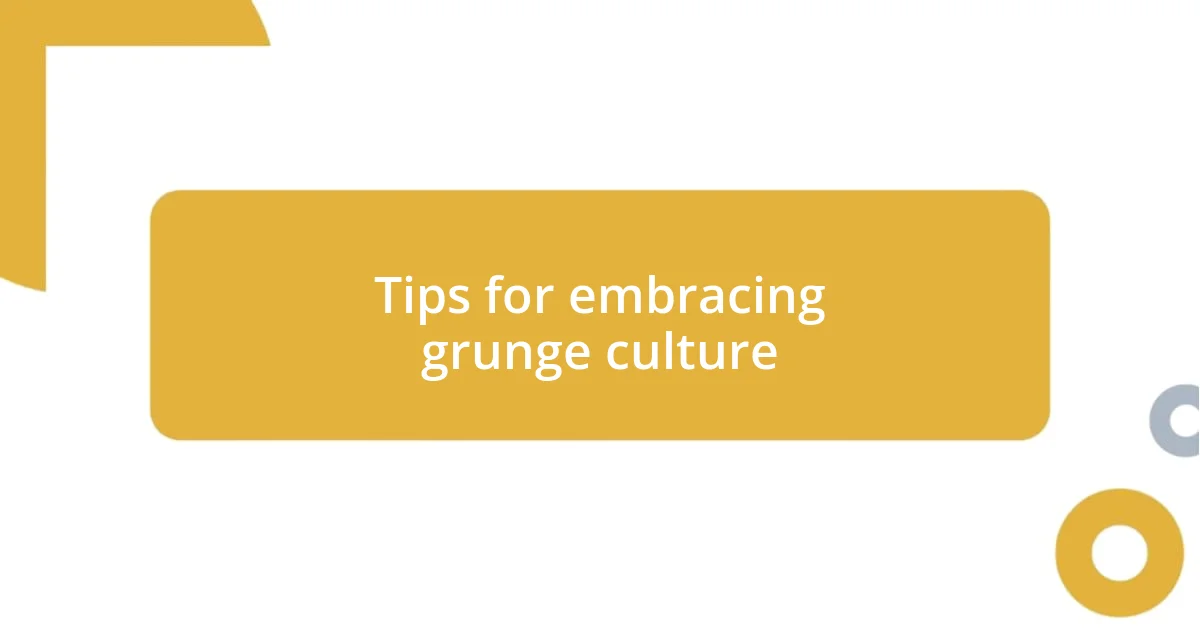
Tips for embracing grunge culture
Embracing grunge culture starts with finding your personal style. I remember the first time I rummaged through a thrift store and discovered a perfectly worn flannel shirt. It felt like wearing a badge of honor, a connection to a time that celebrated authenticity and individuality. Have you found clothing that makes you feel like part of something bigger? Trust me, those little gems can make a world of difference in embracing the vibe.
Music is undeniably at the core of grunge culture too. I still get chills thinking about the first time I went to a local band’s gig in a dimly lit basement. The energy was palpable, and as I swayed to the music, it felt like I was stepping into the shoes of those who lived the grunge era. Exploring live performances, whether big or small, can help you truly resonate with that raw energy and communal spirit. Have you ever felt an electric atmosphere at a concert that just took your breath away?
Lastly, don’t shy away from the emotional aspects of grunge. There’s a deep-rooted authenticity in the lyrics and themes that touch on struggles and vulnerability. I vividly recall journaling my thoughts during a tough period in my life while listening to Alice in Chains. The way music helped me process my feelings was transformative. It’s essential to allow yourself that space to feel and reflect—how does music help you connect with your emotions? Embracing the highs and lows is what truly captures the essence of grunge culture.












